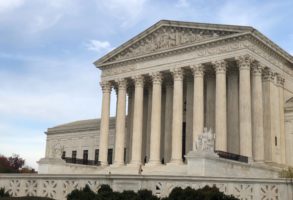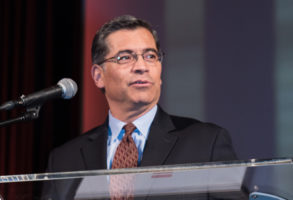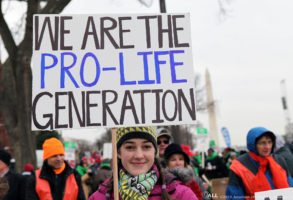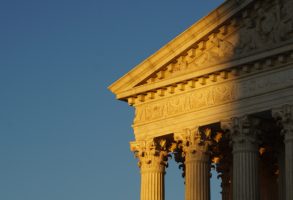Ryan T. Anderson
President
Ryan T. Anderson, Ph.D., is the President of the Ethics and Public Policy Center.
Ryan T. Anderson, Ph.D., is the President of the Ethics and Public Policy Center.
He is the author or co-author of five books, including the just-released Tearing Us Apart: How Abortion Harms Everything and Solves Nothing. Previous books include When Harry Became Sally: Responding to the Transgender Moment, Truth Overruled: The Future of Marriage and Religious Freedom, What Is Marriage? Man and Woman: A Defense, and Debating Religious Liberty and Discrimination. He is the co-editor of A Liberalism Safe for Catholicism? Perspectives from “The Review of Politics.”
Anderson’s research has been cited by two U.S. Supreme Court justices, Justice Samuel Alito and Justice Clarence Thomas, in two Supreme Court cases.
He received his bachelor of arts degree from Princeton University, graduating Phi Beta Kappa and magna cum laude, and he received his doctoral degree in political philosophy from the University of Notre Dame. His dissertation was titled: “Neither Liberal Nor Libertarian: A Natural Law Approach to Social Justice and Economic Rights.”
Anderson has made appearances on ABC, CNN, CNBC, MSNBC, and Fox News. His work has been published by the New York Times, the Washington Post, the Wall Street Journal, Oxford University Press, Cambridge University Press, the Harvard Journal of Law and Public Policy, the Harvard Health Policy Review, the Georgetown Journal of Law and Public Policy, First Things, the Claremont Review of Books, and National Review.
He is the John Paul II Teaching Fellow in Social Thought at the University of Dallas, a member of the James Madison Society at Princeton University, and a Fellow of the Institute for Human Ecology at the Catholic University of America, as well as the Founding Editor of Public Discourse, the online journal of the Witherspoon Institute of Princeton, New Jersey.
For 9 years he was the William E. Simon senior research fellow at The Heritage Foundation, and has served as an adjunct professor of philosophy and political science at Christendom College, and a Visiting Fellow at the Veritas Center at Franciscan University. He has also served as an assistant editor of First Things.
Follow him on Twitter at @RyanTAnd. For his latest essays and videos, you can follow his public Facebook page.
Click here to download a hi-res version of this photo for media and promotional use. Photo credit David Hills.
Anthropological Fallacies
Ryan T. Anderson

Whether you’re discussing abortion or euthanasia, same-sex marriage or transgender ideology, it is highly likely that body-self dualism will be either explicitly appealed to, or implicitly assumed, as the conversation plays out.
Articles
The Public Discourse / June 21, 2022
In the Transgender Debate, It’s Language vs. Reality
Ryan T. Anderson

Transgender activists seem to think that by changing the language used to define sex, they can change reality.
Articles
National Review / June 15, 2022
No, Overturning Roe Would Not Establish Theocracy
Ryan T. Anderson

Since the leaking of Justice Samuel Alito’s draft opinion overturning Roe v. Wade, activists, opinion journalists, and even famous authors have been shrieking that…
Articles
First Things / May 23, 2022
There Is No Escaping Natural Law
Ryan T. Anderson

As much as people today speak of moral relativism and legal positivism, the truth of the matter is that we can’t escape the natural law.
Articles
Religion and Liberty / May 23, 2022
How the Person Became a Self
Ryan T. Anderson

In Strange New World, Trueman uncovers and describes the underlying social and intellectual forces that explain why his grandfather would have rejected sexual reassignment without a second thought but President Biden can declare that “transgender equality is the civil rights issue of our time.”
Articles
First Things / April 5, 2022
An Open Letter to HHS Secretary Becerra on Ending the Covid-19 Public Health “Emergency”
Ryan T. Anderson

Human flourishing requires both public health and individual liberty and an appropriate balance between these goods when they conflict. We know that human beings flourish in community; we are social by nature. As such, we should not be surprised that government Covid-19 regulations mandating school closures, lockdowns, masking, and vaccination have isolated us from our fellow citizens and imposed significant attendant harms. It is time to declare this emergency over and once again let people take responsibility for themselves.
Public Discourse / March 18, 2022
The Promise and Peril of the Political Common Good
Ryan T. Anderson

Conservatism is neither liberal nor libertarian. It seeks to promote the common good, which entails an appreciation for constitutive human goods and the appropriate freedom to pursue them.
Articles
The New Criterion - January 2022 issue / February 3, 2022
Tearing Us Apart: How Abortion Harms Everything and Solves Nothing
Ryan T. Anderson

Announcing a new book equipping readers for the next chapter of the pro-life movement.
Articles
National Review / January 18, 2022
Why I’m Pro-Vaccine but Anti-Vaccine Mandate
Ryan T. Anderson

We can protect the most vulnerable without forcing the vaccine on those who conscientiously object. We can be both pro-vaccine and anti-vaccine mandate.
Articles
Newsweek / December 21, 2021
EPPC Scholars File Ninth Circuit Brief Supporting Challenge to Washington Law Effectively Mandating “Gender-Affirmation-Only” Therapy…
Mary Rice Hasson

This week, EPPC Kate O’Beirne Fellow Mary Rice Hasson and EPPC President Ryan T. Anderson filed an amicus curiae brief in a case challenging a law in Washington state that effectively mandates that therapists serving minors use a “gender-affirmation-only” approach and that denies effective psychotherapy to minors seeking psychological help to explore alternative pathways, including the possibility of desisting from a transgender identity.
Articles
Publications / December 16, 2021

